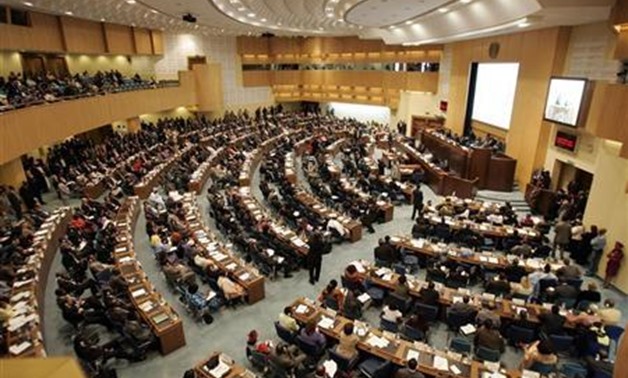
A general view shows the official opening session of the 12th African Union Summit of Heads of States in Ethiopia's capital Addis Ababa February 2, 2009 - REUTERS/Antony Njuguna
CAIRO – 29 January 2018: The Committee of African Heads of State and Government on Climate Change (CAHOSCC) recommended Egypt to be a member of the Permanent Representatives Committee (PRC) on Monday, the Minister of Environment Khaled Fahmy told press.
The PRC receives instructions from the AU Executive Council and assumes different daily tasks on behalf of the council and the AU Assembly of Heads of State and Government. The Executive Council is in charge of implementing the policies adopted by the assembly according to Article 13 of the AU Constitutive Act, and it comprises of the foreign ministers of all 55 member states.
The PRC convenes every month and in time of any ad hoc sessions. It consists of the AU member states' ambassadors to Addis Ababa and has as quorum of two-thirds of member states eligible to vote.
The committee has a formal bureau formed of a chairperson, three vice-chairpersons and a rapporteur who also compose the bureaus of the assembly and the Executive Council and hold office for a one-year term. There is also an informal bureau that consists of 15 member states.
CAHOSCC's recommendation of Egypt stemmed from the latter's backing of the Africa Adaptation Initiative (AAI) on the international scale. The AAI was established in June 2015 and aims at boosting adaptation action and approaches addressing loss and damage in the continent.
The initiative adopts four areas of focus to achieve such goals. Those are enhancing climate information services, strengthening policies and institutions, supporting the implementation of concrete adaptation on the ground, and increasing the flow of finance and investments to support implementation of concrete adaptation programmes and projects.
President Abdel Fatah al-Sisi had presented two initiatives in the 2015 United Nations Climate Change Conference in Paris regarding the use of renewable energy in Africa, the diversification of sources of funding that African countries need to cope with climate change and the reduction of greenhouse gas emissions.
The recommendation was during the CAHOSCC's meeting attended by the environment ministers of Egypt, Uganda, Mauritius, Nigeria, South Africa, Algeria, Democratic Republic of the Congo, Mozambique, Rwanda and Kenya, as well as the Moroccan prime minister, the foreign minister of Gabon, the UNDP head, the representatives of the African Union chairperson, and regional and international organizations.
According to the Office of the Special Advisor on Africa (OSAA), the continent is "extremely vulnerable to the impact of climate change," embodied in deforestation, soil erosion, desertification, drought, loss of biodiversity, air pollution, land degradation, rising sea levels and the depletion of fish stocks.
President Sisi, accompanied by a number of ministers, attended the 30th AU Summit held in Addis Ababa from January 22-29. The president held two meetings on the summit's sidelines. One was with his Sudanese counterpart Omar al-Bashir, and the other was with Bashir and Ethiopian Prime Minister Hailemariam Desalegn.
The leaders of Egypt and Sudan agreed on forming a joint ministerial commission comprising of the foreign ministers and intelligence heads of both countries to handle bilateral matters and issues facing the two countries. It will be summoned soon to put into effect the plans agreed upon.
Minister of Foreign Affairs Sameh Shoukry stated that it was agreed during the tripartite summit between Egypt, Sudan and Ethiopia on Monday to fix all Grand Ethiopia Renaissance Dam (GERD) issues in a month.
When asked by one of the reporters if there will be a mediator to interfere in the negotiations, Shoukry answered, “There will be no mediator.”
Sisi presided over the Peace and Security Council (PSC) session on Sunday during his participation in the 30th African Union (AU) Summit. The theme was “The Integrated Approach against Cross-border Terrorism in Africa.”
The PSC is chaired by Egypt for January. The session was attended by South Africa, Nigeria, Kenya, Uganda, Rwanda, Chad, Niger, Sierra Leone, Burundi, Zambia, the AU chairperson and the UN Secretary General.
In his speech, the president emphasized the international community’s increasing awareness of the importance of intensifying efforts to combat terrorism, as it is imposing a real threat on international peace and security.
“In order to achieve that, we have to develop knowledge of the terrorism phenomenon, which acquires new dimensions. It is no longer limited to a particular continent, region or society with respect to its level of development,” the president added.
“Setting plans to achieve security and prosperity for our people, in parallel with combating terrorism and its attempts to cripple development projects, would not be efficient without understanding the environment where terrorism thrives,” President Sisi stated.
He displayed the various strategic challenges facing African countries that are ensued from widespread armed conflict, granting terrorism and extremism a fertile environment to grow. Sisi highlighted that terrorist groups exploit the void created by the weakness of state institutions to strengthen their presence, recruit members and collect money to commit their crimes.
The president asserted that a good reading of the history of different terrorist organizations shows that there are minor differences in the reasons such groups use to justify violence and terrorism.
“It is important to be strict when dealing with parties providing political, media, military and financial support to terrorist entities on the international scale. These acts are a blatant breach of international law and UN Security Council and AU resolutions. Thus, we have to intensify cooperation and coordination to eliminate support of terrorism,” President Sisi concluded.
Sisi prepared a summary of discussions and propositions by member states on cooperation to combat terrorism, endorsing the final statement by the PSC session.


Comments
Leave a Comment